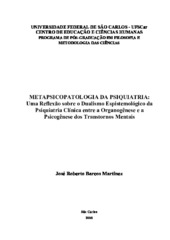| dc.contributor.author | Martinez, José Roberto Barcos | |
| dc.date.accessioned | 2016-06-02T20:12:10Z | |
| dc.date.available | 2007-01-18 | |
| dc.date.available | 2016-06-02T20:12:10Z | |
| dc.date.issued | 2006-12-15 | |
| dc.identifier.citation | MARTINEZ, José Roberto Barcos. Metapsicopatologia da psiquiatria: uma reflexão sobre o dualismo epistemológico da psiquiatria clínica entre a organogênese e a psicogênese dos transtornos mentais.. 2006. 448 f. Tese (Doutorado em Ciências Humanas) - Universidade Federal de São Carlos, São Carlos, 2006. | por |
| dc.identifier.uri | https://repositorio.ufscar.br/handle/ufscar/4743 | |
| dc.description.abstract | This doctoral thesis intends to analyze the main concepts of mental disease and
the problematic relation between the organicism and the psychodinamism throughout the
history of the psychopathologic ideas that came to constitute the scientific clinical psychiatry,
from Philippe Pinel, in the beginning of XIX century, until the chaos of the no theoretical
pretense descriptive of the official nosography of the end of XX century and beginning of
XXI century (I.C.D.-10). The epistemologic conflict between the psychogenic and
organogenic doctrines had resulted in many frustrated attempts of solution. The hermeneuticsynthetic
psychopathology of Carl Gustav the Jung (1875-1961) and the phenomenonstructural
psychopathology of Eugène Minkowski (1885-1972) stand out among the most
promising proposals of XX century. The basic concepts of these authors keep an essential
similarity, besides belonging to schools have different thoughts. However, their theorization
go in parallel thinking about a psychopathologic formularization psychorganodinamic that
is similar in its most essential principles. The antimechanist solution, anti-atomicist and antireductionist,
of both, remind the current biological psychiatry that the desired and necessary
consensual psychiatric theory will not do without a Metapsychopatology of the psychiatry
that consider the irreducible biopsychosocial complexity of the normal or pathological human
being. And, neither psychiatry will gain a satisfactory nosographic formularization while they
don t reveal the mysteries of the complex etiology of mental disorders. | eng |
| dc.format | application/pdf | por |
| dc.language | por | por |
| dc.publisher | Universidade Federal de São Carlos | por |
| dc.rights | Acesso Aberto | por |
| dc.subject | Epistemologia | por |
| dc.subject | Psicopatologia | por |
| dc.subject | Psiquiatria | por |
| dc.subject | Psicanálise | por |
| dc.subject | Metapsicopatologia | por |
| dc.subject | Fenomenologia | por |
| dc.subject | Psychiatry | eng |
| dc.subject | Metapsychopathology | eng |
| dc.subject | Psychopathology | eng |
| dc.subject | Etiology | eng |
| dc.subject | Etiopathogeny | eng |
| dc.subject | Psychodynamic | eng |
| dc.subject | Organodynamic concept | eng |
| dc.subject | Psychorganodynamic | eng |
| dc.subject | Psychogenesis | eng |
| dc.subject | Organogenesis | eng |
| dc.subject | Psychorganogenesis | eng |
| dc.subject | Ontogenesis | eng |
| dc.subject | Epistemology of Psychiatry | eng |
| dc.subject | Constructive-synthetic method | eng |
| dc.subject | Nosography
16. Hereditary succession 17. Phenomenostructural method 18. Nosology. | eng |
| dc.title | Metapsicopatologia da psiquiatria: uma reflexão sobre o dualismo epistemológico da psiquiatria clínica entre a organogênese e a psicogênese dos transtornos mentais | por |
| dc.type | Tese | por |
| dc.contributor.advisor1 | Simanke, Richard Theisen | |
| dc.contributor.advisor1Lattes | http://lattes.cnpq.br/5431145327759147 | por |
| dc.description.resumo | A presente tese de doutorado pretende analisar os principais conceitos de
doença mental e a problemática relação entre o organicismo e o psicodinamismo ao longo da
história das idéias psicopatológicas que vieram constituir a psiquiatria clínica científica, a
partir de Philippe Pinel, no início do século XIX, até o caos da pretensa ateoricidade
descritiva da nosografia oficial do final do século XX e início do século XXI (C.I.D.-10). O
conflito epistemológico entre as doutrinas psicogênicas e organogênicas resultou em várias
tentativas frustradas de solução. Dentre as mais promissoras propostas do século XX,
destacam-se as da psicopatologia hermenêutico-sintética de Carl Gustav Jung (1875-1961) e
da psicopatologia fenomeno-estrutural de Eugène Minkowski (1885-1972). Os conceitos
fundamentais desses autores guardam uma semelhança essencial, apesar de pertencerem a
escolas de pensamento diferentes; todavia, suas teorizações caminham paralelamente no
sentido de uma formulação psicopatológica psicorganodinâmica muito parecida em seus
princípios mais essenciais. A solução antimecanicista, anti-atomicista e anti-reducionista, de
ambos, lembram à psiquiatria biológica atual que a tão desejada e necessária teoria
psiquiátrica consensual não prescindirá de uma Metapsicopatologia da psiquiatria que
considere a complexidade biopsicossocial irredutível do ser humano normal ou patológico. E,
tampouco a psiquiatria chegará a uma formulação nosográfica satisfatória enquanto não
desvendar os mistérios da etiologia complexa dos transtornos mentais. | por |
| dc.publisher.country | BR | por |
| dc.publisher.initials | UFSCar | por |
| dc.publisher.program | Programa de Pós-Graduação em Filosofia - PPGFil | por |
| dc.subject.cnpq | CIENCIAS HUMANAS::FILOSOFIA | por |
| dc.contributor.authorlattes | http://lattes.cnpq.br/7556022380351346 | por |
